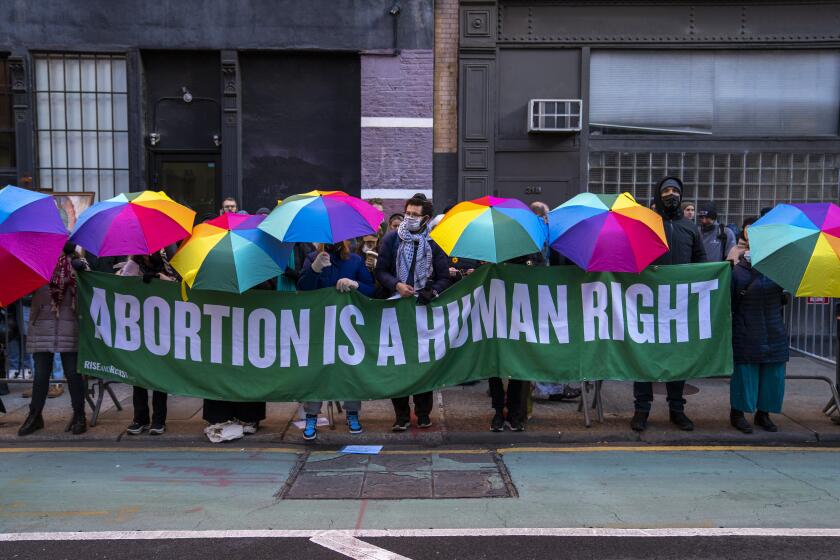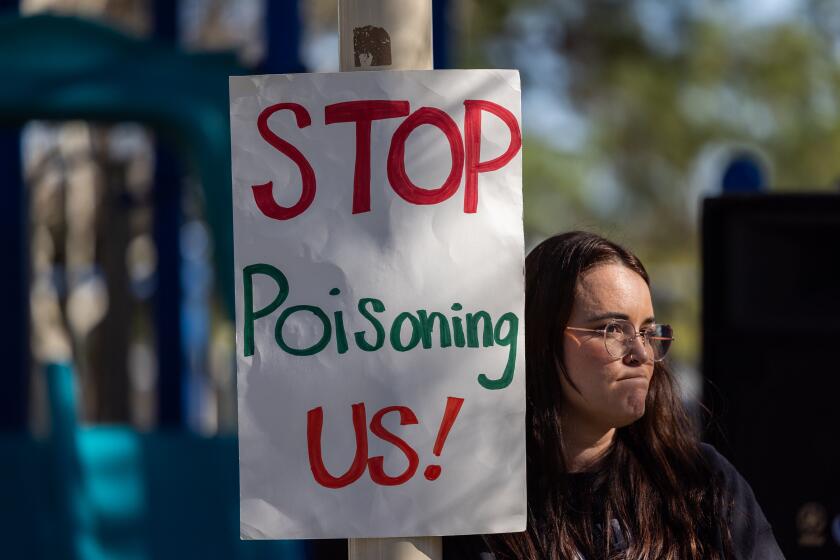Editorial: A right to IVF or abortion will never be protected if fetuses and embryos are declared people

The Alabama Supreme Court decision last month determining that frozen embryos have the same rights as children brought the personhood debate to a surreal level that should terrify anyone who supports the right to terminate a pregnancy or start one in a lab through in vitro fertilization.
It was a preposterous ruling — three couples whose frozen embryos were accidentally destroyed at a fertility clinic were found to have the right to sue for wrongful death. But it is an example of the growing anti-abortion effort to redefine embryos — in utero and in laboratory dishes — and fetuses as people with the 14th Amendment right of equal protection under the law.
Dobbs vs. Jackson Women’s Health Organization, which reversed abortion rights under Roe vs. Wade, laid the groundwork for further denial of individual liberty on religious grounds.
It’s all part of the chaos over reproductive rights that has engulfed the country since the Supreme Court took away the constitutional right to an abortion in June 2022, and conservative states rushed new and horrible restrictions into law. Now conservative anti-abortion politicians and their supporters have finally found out what it’s like to have a court interfere with their reproductive freedom.
Republican and Democratic lawmakers in Alabama quickly passed a bill Thursday to protect in vitro fertilization providers from criminal and civil liability — some clinics halted procedures after the ruling. It wasn’t a victory for reproductive rights, however, just a stop-gap measure that will be obliterated if the personhood movement gains more traction in state legislatures.
Since Roe vs. Wade was overturned, more than a dozen states have introduced personhood bills bestowing legal rights upon fetuses or embryos, or both. Legislators in Iowa and Colorado have introduced bills that would define personhood as beginning at fertilization and subject to the state’s homicide, wrongful death and assault laws — with no IVF exceptions.
State and local officials are trying to concoct new ways to block abortion funds, private nonprofits that help people travel to states that still provide abortion care.
Last week, after the Alabama decision, lawmakers in Florida shelved a bill that protected “unborn” children from wrongful death. But it likely will return in some form.
And 18 members of the U.S. Senate and 166 members of the U.S. House co-sponsored legislation in 2021 that would have conferred equal rights under the 14th Amendment to a fertilized egg. The bills have gone nowhere, but that could change depending on the outcome of the election in November.
A number of personhood laws are already on the books. A Georgia law called the Living Infants Fairness and Equality (LIFE) Act declares a fetus a person after six weeks of pregnancy and bans abortion after that point. Louisiana has a law specifically preventing the destruction of embryos.
Even in states where abortion access is not under threat, purple districts could turn blue because the right is so out of step with American voters.
Abortion foes have been trying to shift the storyline, with a slew of new state laws, from punishing pregnant women to championing innocent fetuses, which is an easier sell to the public. Even Alabama Supreme Court Chief Justice Tom Parker, in his concurrence, waxed on about how “even before birth, all human beings bear the image of God, and their lives cannot be destroyed without effacing his glory.”
While personhood laws define an embryo or fetus as having legal rights, state fetal homicide laws vary in how broadly they consider fetuses and embryos as potential victims. Some don’t say anything about abortion. Others exclude it. California’s murder statute extends to killing a fetus if it is done maliciously. But it specifically excludes abortion or any action taken by a person carrying the fetus.
This move toward declaring fetuses and embryos people with legal rights is all the more reason we need a federal law protecting the right to abortion. The decisions that voters make this year in elections will have enormous implications for how much bodily autonomy women are allowed, and could set a course for a dystopian future where their rights are trumped by the rights of their embryos.
Even straightforward legislative efforts to protect IVF have stalled in Washington, D.C. Sen. Tammy Duckworth (D-Ill.) tried to parlay bipartisan concern about the Alabama ruling into support to rush through a bill that would protect an individual’s right to IVF and a clinic’s right to do the procedure. The bill also would allow the U.S. attorney general, an individual or a healthcare provider to sue a state or municipality preventing or limiting that access.
Apparently all that was a bridge too far for Republican Sen. Cindy Hyde-Smith from Mississippi, whose “no” vote quashed its chances. The urgency bill could only pass with unanimous support in the Senate. Hyde-Smith claimed falsely the bill would, among other things, legalize human cloning and commercial surrogacy (which is already legal in a few states).
The IVF ruling illustrates the further confusion that will come from personhood laws. The IVF procedure involves collecting multiple eggs to fertilize and store so a patient can have several attempts at getting pregnant or determine with their doctor which embryos have the best chance of developing into a healthy pregnancy. If destroying the unused embryos is a crime equal to killing, say, an infant, then another reproductive right will be lost to Americans.
Abortion opponents have so fetishized embryos and fetuses that even when they support the concept of IVF, they can’t let go of their quest for personhood laws that may end up not just prohibiting abortion but making infeasible the IVF procedure that has been such a lifeline for so many who cannot conceive on their own.
More to Read
A cure for the common opinion
Get thought-provoking perspectives with our weekly newsletter.
You may occasionally receive promotional content from the Los Angeles Times.








